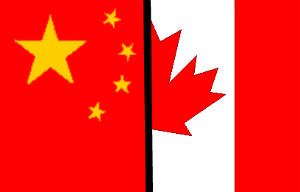
Note: West Coast Environmental Law is proud to have provided an initial grant to the Hupacasath Nation through the Environmental Dispute Resolution Fund (EDRF) to develop this legal challenge.
“We stand together! We stand together! We stand together!” On June 5th, 2013, West Coast Environmental Law’s Executive Director Jessica Clogg and three legal interns joined the hundreds of voices chanting “We stand together!” outside the Federal Court in downtown Vancouver. The crowd was gathered to support Hupacasath First Nation’s courageous and inspiring effort in launching a legal challenge against the Federal Government. The lawsuit attacks the ominous Canada-China Foreign Investment Promotion and Protection Agreement (FIPA) by claiming the government has violated the Constitution’s section 35 Aboriginal rights.
 FIPA is not only a threat to First Nations’ rights, but also a threat to all Canadians concerned about a healthy environment. The Agreement would allow Chinese investors to sue Canadian governments for any decisions that threaten the investors’ company’s profits. For example, if there were any Chinese ownership in the Enbridge Northern Gateway pipeline, and the government vetoed the pipeline project, it could result in a costly suit against the Canadian government.
FIPA is not only a threat to First Nations’ rights, but also a threat to all Canadians concerned about a healthy environment. The Agreement would allow Chinese investors to sue Canadian governments for any decisions that threaten the investors’ company’s profits. For example, if there were any Chinese ownership in the Enbridge Northern Gateway pipeline, and the government vetoed the pipeline project, it could result in a costly suit against the Canadian government.
In the (sunny) courtroom
The morning after the rally, we gathered in a sunny 8th floor courtroom with a panoramic downtown view - for those familiar with courtrooms, this is a unique and welcome feature!
When court resumed for its second day, Mark Underhill, Hupacasath First Nation’s lawyer, succinctly and effectively responded to the Chief Justice’s concerns, citing case law from only the week before. Mr. Underhill wrapped up his compelling arguments and reminded the court of the ‘honour of the Crown’ and of their duty to consult with First Nations as part of Canada’s reconciliatory efforts.
Mr. Underhill’s written submissions summarize the points he was making:
The Applicant says that the ratification of the FIPA would represent a material and lasting change to the resource and land management regime in Canada, by granting Chinese investors with new, substantive and enforceable rights in respect of investments which they have, or may obtain, in the traditional territories of First Nations, including that of the Applicant. The effect of these rights is to constrain the Crown’s discretion to deal with resources and land over which First Nations assert Aboriginal Rights and Title, and to reduce the scope of self government powers which the Applicant will be able to exercise, whether through the exercise of its aboriginal rights, the treaty process, or the use of delegated authority from government. The jurisprudence is clear that, in such circumstances, the constitutional principle of the honour of the Crown requires consultation and potential accommodation before Canada agrees to be bound by the obligations set out in the FIPPA.
The Crown submissions
After the morning recess, the Crown tentatively began their arguments in a room buzzing with the positive energy of the Hupacasath First Nation and their supporters. The Crown attorney began his arguments but was interrupted shortly thereafter by the Chief Justice who informed them that he was already familiar with their written submissions. He wanted to hear the Crown’s responses to the nuanced issues addressed in Hupacasath’s earlier submissions. In our opinion, the Crown failed to reach the high water mark set by Mr. Underhill’s earlier responses.
The Crown’s submissions argued that the FIPA will not affect the Rights and Title of the Hupacasath, and therefore that no consultation is required:
The [Canada China] FIPA has no application to the way in which land and resources are managed within Canada. It does not change, or set the stage for future changes, to these domestic regulatory regimes. The CCFIPA does not alter in any way the Crown's duty to consult where a resource management plan or project is contemplated that may adversely impact the Applicant's rights.
The Crown seems to be arguing that there is no relationship between:
- the FIPPA requirement that Canada pay compensation to Chinese investors for regulation occurring in Hupacasath Territory; and
- the obligation to consult and accommodate the Hupacasath decisions which might impact their Rights and Title within their Territory.
Mr. Underhill, in a written reply on behalf of the Hupacasath, responded:
… [R]easonable consultation and accommodation entails a balancing of the various interests involved, with attention to the particular factual context. Granting one group of resource investors new enforceable rights with respect to their investments, backed up by a right to compensation funded by Canadian tax payers, changes the equation. To suggest that this will have no impact on what happens on the ground is simply not sustainable.
Hupacasath First Nation has demonstrated immense courage by undertaking this legal battle against the Federal Government. This action stands as the last major impediment to approving the Canada-China FIPPA and should command the attention and support of all.
By Paloma Corrin & Mathieu Poirier, Legal Interns
Attachments